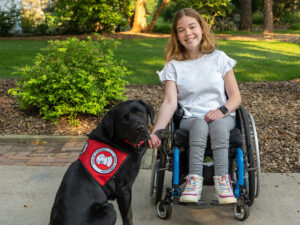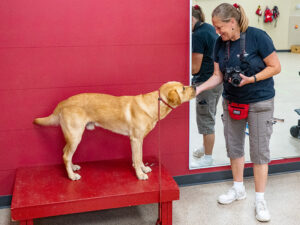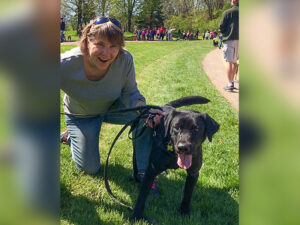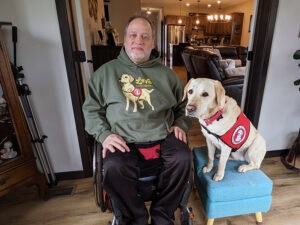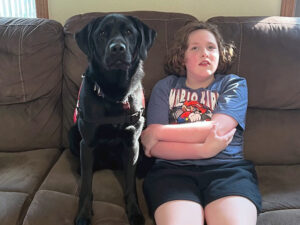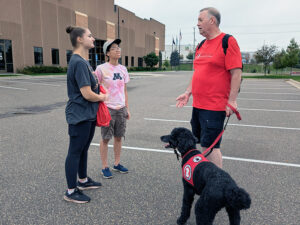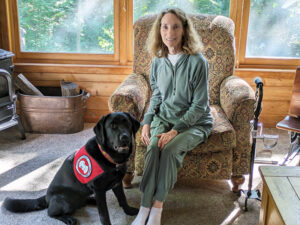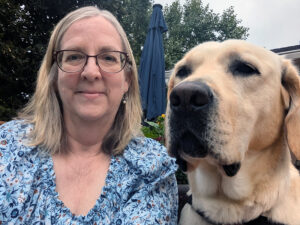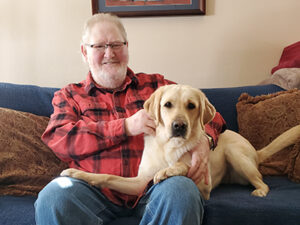Twelve-year-old Leah recently had a major back surgery, fusing nine of her vertebrae with a rod in her spinal column. Fused by her side during recovery has been her new Mobility Assist Dog, Auggie. Leah has spina bifida and is paralyzed from the hips down. While she and her parents, Ty and Jen, have managed well over the years, helping with morning routines has become more difficult for them as she has grown. When Can Do Canines presented at their church in 2023, they were intrigued. Ty says that learning more about the organization, “ended up with us seeing the …
Service Dog
Loving the Dogs While Loving Her Job
In 2012, when Stacy Sheldon-Wilkinson was hired as a part-time staff member, she was one of only a handful of part-time kennel staff members caring for eight dogs in the Can Do Canines kennel. Since then, the kennel, where our program dogs reside in their final few months before being placed with a client, has grown to host approximately 30 dogs at a time, with about a dozen full-time and part-time staff members sharing duties. Soon after starting with us, Stacy began writing protocols for kennel responsibilities, and she earned the role as our first Kennel Manager. Interested in and …
Walking Clients Through the Loss of Their Dog
Anyone who has lost a pet knows that it can feel devastating. The compounding aspect of that animal being one that serves to provide independence and other necessary life skills can be that much worse. Karen and Ben, her career-changed Can Do Canine, offer smiles for the camera. For Can Do Canine graduates who experience the death or retirement of an assistance dog, volunteer Karen Kodzik is there to help. Karen began her relationship with Can Do Canines about eight years ago, hosting dogs and helping at various events. “As my schedule shifted, I could do fostering less and less,” …
Moses and Jason: A Long-awaited Match Made in Heaven
After a snowmobile accident in 1995 left him paralyzed from the chest down, Jason waited a long time to get an assistance dog. Following his accident, Jason spent four months in the hospital recuperating then jumped right into playing sports. He was active and busy and just didn’t feel like the time was right to get a dog. “But I’m less independent now,” Jason says. “I met a guy at church who has an assistance dog, and he told me about Can Do Canines.” Finally ready to take the first step, Jason went to an open house and soon filled …
Appreciating the Positive Effects of an Autism Assist Dog
“Autism affects every aspect of Norah’s life.” This statement, made by Norah’s mom, Kelly, sums up the challenges Norah faces. Kelly shares a few examples validating this, saying, “Norah has had problems sleeping since birth. Norah does not speak. She does repeat words. Norah has few self-care skills. She walks on her toes so she has AFOs (Ankle Foot Orthosis braces) to help with this.” These challenges, alone, are enough to create anxiety for any parent, and Kelly and her husband, Brian, are no exception. However, what concerned them the most was leaving the house with Norah. Kelly says, “Taking …
Encountering Assistance Dogs in the Wild
Don’t be surprised the next time you are cruising through the produce department of the grocery store, picking up cleaning supplies in Target, or finding the perfect paint color in Menard’s if you see an assistance dog team stroll by. Can Do Canines has over 350 active teams out and about in the world, not to mention the dogs-in-training that might be practicing with a trained volunteer for their future role. That’s not including assistance dogs from other organizations. Most people understand that assistance dogs should not be petted when working. Etiquette for assistance dog teams goes beyond that, though. …
Even Better Than a “Teacher’s Pet”
Kelli was a second-grade teacher for her profession, but in her spare time, she loved to ride horses. A fall from a horse in 2020, though, changed her life. After an eight-day coma scare, Kelli began recovery from a traumatic brain injury that affected the function of the right side of her body. Her right eye no longer focuses correctly due to nerve damage; she is forced to use her left, non-dominant hand for many tasks; and she uses a cane to account for balance issues. The many adjustments in her life and the multiple therapies she regularly undergoes quickly …
Linda and Dean Wedul’s 19-Year Commitment is a Win-Win
It was Linda and Dean Wedul’s 15-year-old daughter who first introduced their family to Can Do Canines in 2005 after reading an article about someone who volunteered with service dogs. “I told her if she did the research and found an organization we could volunteer,” remembers Linda. “I honestly didn’t think she would follow up. About two weeks later we had an appointment for a house inspection with Julianne and within a week had a very large Labradoodle called Nike. When our daughter moved on to college, we weren’t sure if we could manage the time commitment with two people, …
Vanya is Tuned in to Kevin’s Needs
Since 1976, Kevin has been a ham radio operator. Using this type of party-line system, he says, “I literally try to see how many countries I can talk to in the world. At last count, I think I had right around 180 … from Antarctica to the North Pole,” and beyond, including the International Space Station. He has been on calls with King Hussein of Jordan, Ronny Milsap, Barry Goldwater, and other celebrities. These days, the biggest superstar in his life may be his Skilled Home Companion, Vanya, a 3-year-old yellow Lab. Trained to pick up items for him; retrieve …
Open House: November 9, 2024
We will be hosting an open house on Saturday, November 9, from 12-2 p.m., at our campus. Potential clients, volunteers, or anyone who might be interested in supporting the organization is invited to attend to learn how an assistance dog changes the life of a person with a disability. There is no pre-registration for this event, so please join us on November 9. You will be asked to share some contact information at our registration table upon arrival. To request a sign language interpreter for the Open House, please contact Laurie at lcarlson@candocanines.org or call 763-331-3000 at least two weeks in advance. We’ll do …

